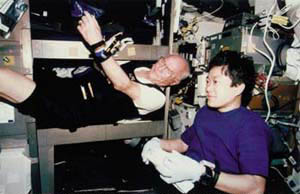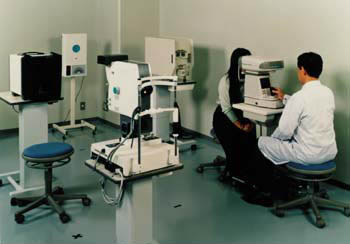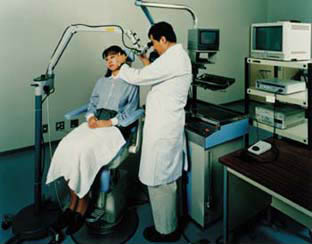
Managing Astronauts' Health for Long-Duration Stays in Space
Maintaining and Promoting Astronauts' Physical and Mental Health |
|

On long-duration space flights, bones loose calcium
and muscles become weaker. This is a November 1998 photograph of Astronauts
Mukai and Glenn undergoing medical examinations aboard Space Shuttle
Discovery. |
Human beings in space experience many changes in their minds and bodies.
For example, if a person stays in a zero-gravity environment for a long
time, bone calcium is decreased and muscles become weaker and atrophic.
People may experience space sickness on the first few days in space, and
after returning to Earth after a long stay in space, they may find it difficult
to stand and may even faint.
People in space are also exposed to radiation which is somehow different
from Earth. At present, little is known about how this radiation affects
an astronaut's health in life time span.
In addition, Canadian, European, Japanese, Russian, and US astronauts
will live together within the relatively limited confines of the International
Space Station (ISS). We can expect that people of different cultural backgrounds
living together in such a closed environment will be subject to considerable
physical and mental stresses.
Considering these physical and mental stresses, potential astronaut
candidates are subjected to many medical and psychological examinations
during the selection process, and only those most physically and mentally
fit are selected as ISS astronaut candidates.
During an astronaut's anticipated 10-year plus active career, we can
expect that some astronauts will become sick or be injured in unexpected
accidents. We must therefore prepare for these situations. In particular,
we must thoroughly study how to properly respond when an astronaut is
injured or becomes sick while aboard ISS. In some sense, ISS can be considered
an extremely remote outpost since doctors will not always be present and
medical equipment and facilities are limited.
For the above reasons, we must carefully consider mental and physical
condition when selecting ISS astronaut candidates. We also need to consider
astronauts during training, on orbit, and rehabilitation after return
to Earth. Finally, we need to plan for astronauts' return to space and
eventual retirement. In other words, we must manage an astronaut's total
physical and mental health from the time he or she is selected as an astronaut
candidate until after he or she retires. This total health management
is what we mean by managing astronauts' health. The ultimate purpose of
this health management is to suitably preserve the astronaut's health
so they can maximize their abilities, perform their duties safely, and
execute their responsibilities.
Specialist from Many Fields Support Astronaut Health Management
If each country's space agency establishes its own methods of astronaut
health management and treats astronauts individually in an international
cooperative project such as ISS, it is inefficient and there will be confusion.
For this reason, an international team composed of senior medical personnel
of each agency is continuing to discuss astronauts' health management
standards.
In JAXA, the Medical Research and Operations Office is responsible
for implementing astronaut health care management. Within this Office,
a team composed of nurses, specialists in psychology, physical training
specialists, specialists in space radiation, and others is formed around
an aerospace medicine group called the Flight Surgeon. The Flight Surgeon,
supported by the team of specialists, is responsible for planning and
implementing Japanese astronaut health management.
The medical fields necessary for astronaut health management cover a
wide area. Therefore, the astronaut health management system is developed
through the continuing support of specialists in each field.
Health Education for Astronauts and Support of their Families are Important
In practical terms, astronaut health management includes the following
activities. First, as previously explained, astronauts are subjected to
both medical and psychological screening during the selection process.
Furthermore, after astronauts are selected, it is necessary to determine
if their physical condition will allow them to perform their duties as
astronauts through regular health check-ups. Should they become sick,
it is necessary to diagnose and treat the illness as quickly as possible
to ensure their long-term service as astronauts.
From another viewpoint, if the astronaut himself or herself does not
fully understand the importance of health care, it will not be possible
to keep and promote astronaut health, no matter how hard the medical staff
works. For this reason, health care education in basic astronaut training
is very important.
To this end, astronauts are scheduled to receive physical training using
methods specially suited for them individually and receive lectures on
nutrition, sleeping, stress relief, and first aid for injuries.
Furthermore, it is necessary to ensure that the astronaut and the astronaut's
family can receive counseling whenever they have some concern about health
problems. It is only natural that the team will have to respond to some
astronaut sickness or injury in every-day life. It is important to maintain
the astronaut's mental health onboard ISS, by making their families free
from worrying about their working on ISS.
Space Medicines is one of the Basic elements of Manned Space Activities
The various medical fields related to astronaut health care are making
advances on the Earth. Based on advances in technology, new medical equipment
is being developed. This technology can be applied to astronaut health
care aboard the ISS. Most suitable medical standards are continuing to
evolve day-by-day. It is necessary to apply the newly gained knowledge
and technology to astronaut health care management.
For this purpose, the Medical Research and Operations Study Development
Office promotes space medical research to better maintain astronaut health.
For example, the Office conducts simulations of long-duration space stays
in cooperation with foreign space agencies, and analyzes the medical data
of Japanese astronauts who have flown aboard the space shuttle. In this
way, the Office continually seeks to improve the astronaut health care
management system.
Through these efforts, NASDA seeks to develop and accumulate basic technology
for Japan's manned space activities.

Eye examination. Based on current astronaut medical
standards, astronauts must pass not only distant vision, but also
color perception, field of view, movement perception, depth perception,
and near vision examinations. |

ENT examination. During basic training, astronauts
undergo altitude and diving training and may suffer tym panitis. To
prevent this, it is important to examine the astronaut's ear drum. |
Last Updated : March 21, 2000
|
